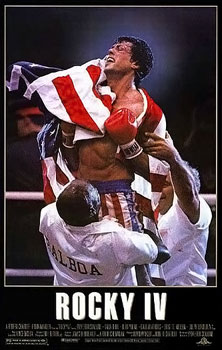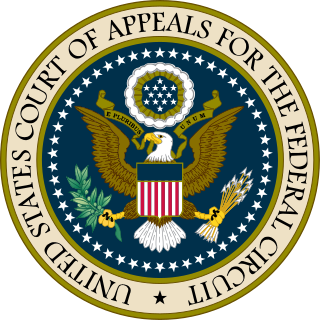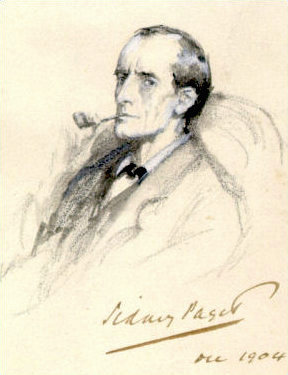Related Research Articles

Fair use is a doctrine in United States law that permits limited use of copyrighted material without having to first acquire permission from the copyright holder. Fair use is one of the limitations to copyright intended to balance the interests of copyright holders with the public interest in the wider distribution and use of creative works by allowing as a defense to copyright infringement claims certain limited uses that might otherwise be considered infringement. The U.S. "fair use doctrine" is generally broader than the "fair dealing" rights known in most countries that inherited English Common Law. The fair use right is a general exception that applies to all different kinds of uses with all types of works. In the U.S., fair use right/exception is based on a flexible proportionality test that examines the purpose of the use, the amount used, and the impact on the market of the original work.

Rocky IV is a 1985 American sports drama film written, directed by, and starring Sylvester Stallone. The film is the sequel to Rocky III (1982) and the fourth installment in the Rocky film series. It also stars Talia Shire, Burt Young, Carl Weathers, Brigitte Nielsen, and Dolph Lundgren. In the film, Rocky Balboa (Stallone) confronts Ivan Drago (Lundgren), a Soviet boxer responsible for a personal tragedy in Balboa's life.
Software copyright is the application of copyright in law to machine-readable software. While many of the legal principles and policy debates concerning software copyright have close parallels in other domains of copyright law, there are a number of distinctive issues that arise with software. This article primarily focuses on topics particular to software.

The Chamberlain Group, Inc. v. Skylink Technologies, Inc., 381 F.3d 1178 is a legal case heard by the United States Court of Appeals for the Federal Circuit concerning the anti-trafficking provision of the Digital Millennium Copyright Act (DMCA), 17 U.S.C. § 1201(a)(2), in the context of two competing universal garage door opener companies. It discusses the statutory structure and legislative history of the DMCA to help clarify the intent of the anti-circumvention provisions and decide who holds the burden of proof. It expresses that the statute creates a cause of action for liability and does not create a property right, and holds that as Chamberlain had alleged that Skylink was in violation of the anti-trafficking provision, it had the burden to prove and failed to show that access was unauthorized and its rights were infringed under the Copyright Act. As Chamberlain incorrectly argued that Skylink had the burden of proof and failed to prove their claim, the court upheld summary judgment in favor of Skylink.

A&M Records, Inc. v. Napster, Inc., 239 F.3d 1004 was a landmark intellectual property case in which the United States Court of Appeals for the Ninth Circuit affirmed a district court ruling that the defendant, peer-to-peer file sharing service Napster, could be held liable for contributory infringement and vicarious infringement of copyright. This was the first major case to address the application of copyright laws to peer-to-peer file sharing.

Fanfiction has encountered problems with intellectual property law due to usage of copyrighted characters without the original creator or copyright owner's consent.
Los Angeles Times v. Free Republic, 56 U.S.P.Q.2d 1862, is a United States district court copyright law case. Several newspapers sued the Internet forum Free Republic for allowing its users to repost the full text of copyrighted newspaper articles, asserting that this constituted copyright infringement. Free Republic claimed that they were not liable under the doctrine of fair use and the First Amendment guarantee of freedom of speech. The federal courts ruled in favor of the newspapers.

Vault Corporation v Quaid Software Ltd. 847 F.2d 255 is a case heard by the United States Court of Appeals for the Fifth Circuit that tested the extent of software copyright. The court held that making RAM copies as an essential step in utilizing software was permissible under §117 of the Copyright Act even if they are used for a purpose that the copyright holder did not intend. It also applied the "substantial noninfringing uses" test from Sony Corp. of America v. Universal City Studios, Inc. to hold that Quaid's software, which defeated Vault's copy protection mechanism, did not make Quaid liable for contributory infringement. It held that Quaid's software was not a derivative work of Vault's software, despite having approximately 30 characters of source code in common. Finally, it held that the Louisiana Software License Enforcement Act clause permitting a copyright holder to prohibit software decompilation or disassembly was preempted by the Copyright Act, and was therefore unenforceable.

Castle Rock Entertainment Inc. v. Carol Publishing Group, 150 F.3d 132, was a U.S. copyright infringement case involving the popular American sitcom Seinfeld. Some U.S. copyright law courses use the case to illustrate modern application of the fair use doctrine. The United States Court of Appeals for the Second Circuit upheld a lower court's summary judgment that the defendant had committed copyright infringement. The decision is noteworthy for classifying Seinfeld trivia not as unprotected facts, but as protectable expression. The court also rejected the defendant's fair use defense finding that any transformative purpose posse, Inc., 510 U.S. 569 (1994).

In copyright law, a derivative work is an expressive creation that includes major copyrightable elements of a first, previously created original work. The derivative work becomes a second, separate work independent from the first. The transformation, modification or adaptation of the work must be substantial and bear its author's personality sufficiently to be original and thus protected by copyright. Translations, cinematic adaptations and musical arrangements are common types of derivative works.
The copyright law of the United States grants monopoly protection for "original works of authorship". With the stated purpose to promote art and culture, copyright law assigns a set of exclusive rights to authors: to make and sell copies of their works, to create derivative works, and to perform or display their works publicly. These exclusive rights are subject to a time and generally expire 70 years after the author's death or 95 years after publication. In the United States, works published before January 1, 1929, are in the public domain.

Substantial similarity, in US copyright law, is the standard used to determine whether a defendant has infringed the reproduction right of a copyright. The standard arises out of the recognition that the exclusive right to make copies of a work would be meaningless if copyright infringement were limited to making only exact and complete reproductions of a work. Many courts also use "substantial similarity" in place of "probative" or "striking similarity" to describe the level of similarity necessary to prove that copying has occurred. A number of tests have been devised by courts to determine substantial similarity. They may rely on expert or lay observation or both and may subjectively judge the feel of a work or critically analyze its elements.

Facebook, Inc. v. Power Ventures, Inc. is a lawsuit brought by Facebook in the United States District Court for the Northern District of California alleging that Power Ventures Inc., a third-party platform, collected user information from Facebook and displayed it on their own website. Facebook claimed violations of the CAN-SPAM Act, the Computer Fraud and Abuse Act ("CFAA"), and the California Comprehensive Computer Data Access and Fraud Act. According to Facebook, Power Ventures Inc. made copies of Facebook's website during the process of extracting user information. Facebook argued that this process causes both direct and indirect copyright infringement. In addition, Facebook alleged this process constitutes a violation of the Digital Millennium Copyright Act ("DMCA"). Finally, Facebook also asserted claims of both state and federal trademark infringement, as well as a claim under California's Unfair Competition Law ("UCL").

Capitol Records, Inc. v. MP3tunes, LLC is a 2011 case from the United States District Court for the Southern District of New York concerning copyright infringement and the Digital Millennium Copyright Act (DMCA). In the case, EMI Music Group and fourteen other record companies claimed copyright infringement against MP3tunes, which provides online music storage lockers, and MP3tunes's founder, Michael Robertson. In a decision that has ramifications for the future of online locker services, the court held that MP3tunes qualifies for safe harbor protection under the DMCA. However, the court found MP3tunes to still be liable for contributory copyright infringement in this case due to its failure to remove infringing songs after receiving takedown notices. The court also held that Robertson is liable for songs he personally copied from unauthorized websites.
Playboy Enterprises, Inc. v. Starware Publishing Corp. 900 F.Supp. 433 was a case heard before the United States District Court for the Southern District of Florida in May 1995. The case revolved around the subject of copyright infringement and exclusive rights in copyrighted works. Plaintiff Playboy Enterprises filed a motion for partial summary judgment of liability of copyright infringement against defendant Starware Publishing Corporation. Specifically, Playboy Enterprises ("PEI") argued that Starware's distribution of 53 of Playboy's images, taken from an online bulletin board, and then sold on a CD-ROM, infringed upon PEI's copyrights. The case affirmed that it was copyright infringement, granting Playboy Enterprises the partial summary judgment. Most importantly, the case established that "The copyright owner need not prove knowledge or intent on the part of the defendant to establish liability for direct copyright infringement."

Wolk v. Kodak Imaging Network, Inc., 840 F. Supp. 2d 724, was a United States district court case in which the visual artist Sheila Wolk brought suit against Kodak Imaging Network, Inc., Eastman Kodak Company, and Photobucket.com, Inc. for copyright infringement. Users uploaded Wolk's work to Photobucket, a user-generated content provider, which had a revenue sharing agreement with Kodak that permitted users to use Kodak Gallery to commercially print (photofinish) images from Photobucket's site—including unauthorized copies of Wolk's artwork.
Contributory copyright infringement is a way of imposing secondary liability for infringement of a copyright. It is a means by which a person may be held liable for copyright infringement even though he or she did not directly engage in the infringing activity. In the United States, the Copyright Act does not itself impose liability for contributory infringement expressly. It is one of the two forms of secondary liability apart from vicarious liability. Contributory infringement is understood to be a form of infringement in which a person is not directly violating a copyright but induces or authorizes another person to directly infringe the copyright.
Copyright protection is available to the creators of a range of works including literary, musical, dramatic and artistic works. Recognition of fictional characters as works eligible for copyright protection has come about with the understanding that characters can be separated from the original works they were embodied in and acquire a new life by featuring in subsequent works.

Klinger v. Conan Doyle Estate, Ltd. was a 2014 decision by the U.S. Court of Appeals for the Seventh Circuit, in response to an appeal filed by the defendants against the 2013 ruling of the U.S. District Court for Northern district of Illinois. These decisions, by the District Court and the Court of the Seventh Circuit, clarified the validity of the use of characters of Sherlock Holmes and his colleague Dr. John Watson, and the story elements, in unlicensed works. Further, the scope of using characters, in the public domain was also clarified.
Marcus Gray et al. v. Katy Perry et al. was a copyright infringement lawsuit against Katheryn Elizabeth Hudson, Jordan Houston, Lukasz Gottwald, Karl Martin Sandberg, Henry Russell Walter ("Cirkut"), Capitol Records and others, in which the plaintiffs Marcus Gray ("Flame"), Emanuel Lambert and Chike Ojukwu alleged that Perry's song "Dark Horse" infringed their exclusive rights in their song "Joyful Noise" pursuant to 17 U.S.C § 106. The focus of the similarity was a short descending pattern known in music as an "ostinato". In both songs, a short ostinato is used repeatedly to form part of the beat of each song and both ostinatos share similar descending shapes. Gray et al. claimed that the instrumental beat of the ostinato in "Joyful Noise" was protectable original expression and that Perry et al. had access to and copied the ostinato when composing "Dark Horse." On March 16, 2020, Judge Christina A. Snyder ultimately found that Gray et al. had failed to satisfy the extrinsic test for substantial similarity, overturning a previous jury verdict which had sided with the plaintiffs. Snyder's ruling was affirmed on appeal.
References
- ↑ Frankel, Susy (2019). The Object and Purpose of Intellectual Property. Edward Elgar Publishing. pp. 337–338. ISBN 978-1-78990-249-5.
- ↑ Calboli, Irene; Ragavan, Srividhya (May 28, 2015). Diversity in Intellectual Property: Identities, Interests, and Intersections. Cambridge University Press. p. 331. ISBN 978-1-107-06552-9.